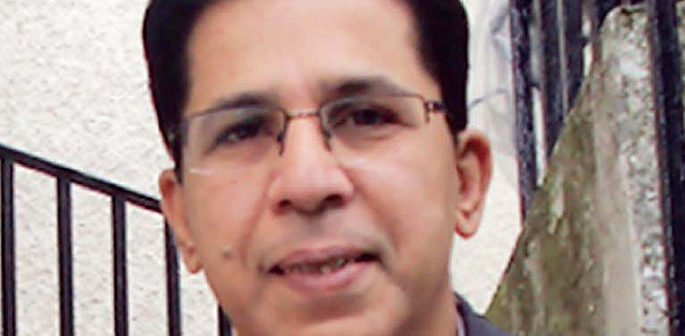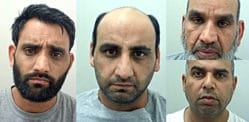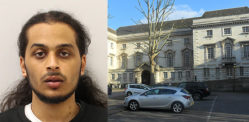"never given up in their pursuit of his killers."
Two Pakistani men have been convicted for the murder of Dr Imran Farooq in Edgware, north London in September 2010.
The conviction comes almost 10 years after the murder of Dr Farooq. Detectives from the Met’s Counter Terrorism Command sifted through thousands of hours of CCTV, spoke with over 4,000 witnesses and collected more than 4,500 exhibits as part of the investigation.
Following a trial in Islamabad, Mohsin Ali Syed, aged 35, was found guilty of murder and conspiracy to murder Dr Imran Farooq.
Muhammad Kashif Khan Kamran, aged 40, and the other individual who was identified by Met detectives as being involved in the murder, was also convicted in absentia of murdering Dr Farooq.
Commander Richard Smith, Head of the Met’s Counter Terrorism Command, said:
“I am pleased that one of the men we identified as being responsible for the murder of Dr Imran Farooq has finally been brought to justice.
“This outcome would not have been possible were it not for the incredible dedication, skill and determination of the investigation team, who for almost ten years, have never given up in their pursuit of his killers.
“I would also like to pay tribute to Dr Imran Farooq’s widow and his family, who have shown tremendous dignity, strength and patience as we have gone about our investigation.”
Dr Farooq was murdered on September 16, 2010, after returning home from work. He was attacked by two men armed with a brick and knives.
The Met’s Counter Terrorism Command investigated the case as it was possible that the murder was connected to the fact that Dr Farooq was a senior figure within the Muttahida Qaumi Movement (MQM) political party.
Initially, there was very little evidence for detectives to use.
A few witnesses had seen the attack and provided descriptions of the two men but there was no CCTV that showed the suspects and no immediate forensic evidence.
Detectives decided to retrace Dr Farooq’s movements on the days leading up to the attack, collecting thousands of hours of CCTV footage, which included footage near Edgware Underground Station and Station Road.
The first breakthrough came when officers spotted a man who seemed to be watching Dr Farooq on the morning of September 16, 2010, as he was using a cashpoint.
The same man, who wore a distinctive cap, uses the cashpoint shortly after.
When officers reviewed other CCTV footage just prior to the murder, they saw a man wearing the same cap running in the direction of Dr Farooq’s home.
Further CCTV from the area was examined, and the same individual was also seen on footage from the day before the murder, where he was with another man, both using the same cashpoint outside Barclay’s bank.
Enquiries with the bank identified the man wearing the cap as Mohsin Ali Syed.
The account was registered to an address in Stanmore, however, the landlord told police that he had reported Syed missing on September 29, 2010.
Around two weeks before the murder, he had given Syed permission for a friend named ‘Kamran’ to stay at the flat.
The landlord also told officers that Syed was studying at a private college in east London and had been since around February 2010.
Detectives contacted the college and discovered that a man called Muhammad Kamran had enrolled at the college on September 8.
His enrolment papers showed Kamran had listed Syed’s Stanmore address as being his UK residence.
Officers continued looking through CCTV footage and found two men, believed to be Syed and Kamran, together on September 14.
They also found footage of Syed entering the local 99p store on the same date, where he was seen purchasing a pack of knives, matching those recovered from the murder scene.
In the days after the murder, detectives found that Syed and Kamran had travelled on a flight from Heathrow to Sri Lanka.
Further enquiries showed that both men then went to Karachi, Pakistan.
In May 2014, investigators publicly announced that the two men were wanted in connection with the murder. However, officers believed that the pair were likely to still be in Pakistan.
In October 2014, a forensic review of the items recovered from the scene was carried out.
A partial thumbprint, which had been found on a knife that was found hidden in a bush near Dr Farooq’s home, was reprocessed and forensic officers were able to confirm that it matched the print on Syed’s UK student visa application.
Enquiries revealed that Syed and Kamran were connected to the MQM Party. The murder had likely been politically-motivated, given Dr Farooq had been suspended from the party at the time of his death.
In June 2015, Pakistani authorities arrested three men, including Syed.
Charges against Syed were subsequently authorised, however, he remained in custody in Pakistan.
The three men in custody in Pakistan, which included Syed, were subsequently charged by Pakistani authorities in connection with the murder of Dr Farooq.
A formal mutual legal assistance (MLA) request by Pakistan to the UK was made in February 2019. This was followed by a temporary change to Pakistani law which provided that the death penalty would not be used in cases where evidence had been transferred under MLA from a state where the death penalty is prohibited.
This was further supported by assurances from the Pakistani authorities that the death penalty would not be imposed in this case.
In August 2019, the MLA request was accepted by UK authorities and officers began the process of providing relevant evidence from their investigation to the Pakistani authorities to assist in their prosecution of Syed and Kamran.
The temporary change to Pakistani law and the consequent provision of UK evidence in a Pakistani trial were ground-breaking steps forward in legal cooperation between the UK and Pakistan.
The trial continued throughout late 2019, and early 2020 and officers from the investigation team attended court in Pakistan to give evidence and provide details of the Met’s investigation into the murder.
Several UK-based witnesses also gave evidence during the trial in Pakistan via video-link at Hendon Magistrates’ Court.
Following his conviction, Syed was sentenced to life imprisonment. Kamran was convicted in absentia, and remains wanted by Pakistani authorities.
As part of the Pakistani prosecution, a number of other individuals were also convicted of conspiracy to murder Dr Farooq, details of which are available from the Pakistani authorities.
Christian Turner, the UK’s High Commissioner to Pakistan, said:
“Today’s conviction marks a team effort between law agencies in the UK and Pakistan working together to get justice for the murder of Dr Imran Farooq.
“This ground-breaking legal collaboration meant that evidence gathered by the British police could be shared with Pakistani prosecutors and used in the successful prosecution of Mohsin Ali Syed.”






























































